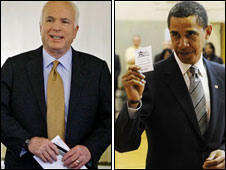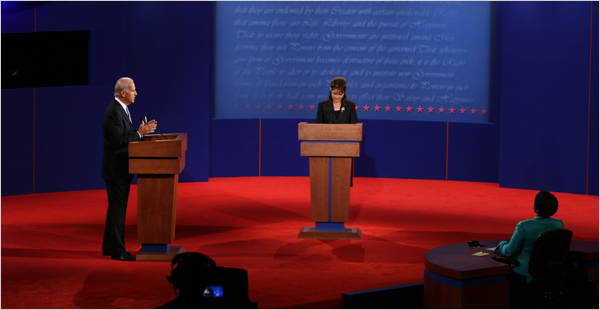 Today, America votes in a presidential election that has dominated U.S. news coverage for almost two years. Noor Hassan, an Iraqi-American who works in the defense industry in Washington, D.C. and describes himself as “a moderate who is slightly left of center,” discusses the outcome of today’s historical U.S. election from a more pragmatic perspective:
Today, America votes in a presidential election that has dominated U.S. news coverage for almost two years. Noor Hassan, an Iraqi-American who works in the defense industry in Washington, D.C. and describes himself as “a moderate who is slightly left of center,” discusses the outcome of today’s historical U.S. election from a more pragmatic perspective:
On the eve of this historic election and in the midst of one of the greatest economic crises to hit the United States, it would seem that one thing is certain: Barack Obama will win this Presidential election quite handily. Looking into my crystal ball, I strongly believe it is likely that the Democrats will seize a filibuster-proof majority in the Senate and seize 30 more seats adding to their majority in the House. Do you know what happened the last time us Democrats held those kinds of leads? It was 1992 and a man named Bill Clinton won the presidency after 12 straight years of Republican rule. We were at the end [although we did not know it at the time] of 20 years of economic recessions and it seemed like Bill would fulfill all our wishes and those stodgy Republicans were through bossing us around and making us look like cruel aggressors and unilateralists in the international community.
Do you remember what actually happened? The Democrats, us liberal intellectuals, well, we failed big time. We failed on every single count. We passed NAFTA, which has certainly been a double-edged sword as it has led to an expansion of the drug trade and illegal immigration in concert with an expansion in trade. Moreover, Bill and Hillary failed to get universal healthcare passed and not one significant new policy was enacted that most of us could recall today.
Do you remember Bill’s theme song during that first election campaign? If you guessed it was ‘Don’t Stop Thinking About Tomorrow,’ then you would be correct. Let us think about the lyrics for a moment. “Everything will be better than BEFORE, yesterday’s gone…yesterday’s gone!” Right? Right…and what CHANGE actually occurred? Well, we got a president who could speak like his voice was coated with molasses and rainbows, was very popular with the American voter and was loved around the world by foreign leaders and foreign audiences. Does no one remember this? What did Bill actually accomplish? The answer…NOTHING.
I love Bill Clinton the politician and the intellectual. I admire his guile, his wit and his charm. However, I still admit he accomplished NOTHING. The economy boomed as a result of the technological revolution and the outsourcing of labor to the developing world, thereby mitigating overhead costs due to low-wage foreign labor and increasing U.S. corporate profits. As with most major economic shifts, this was not because of anything a sitting president did. What did our early 90’s agent of change bring to us? Although he had affairs in the White House, we all still loved him [his approval rating actually went UP during this time!]. He encouraged us to think about what the definition of ‘is‘ is. Does this not remind you of anything? Should anyone forget some of his other gaffes in office, I would like to remind you: his ‘wag the dog’ air strikes against Libya to draw attention away from the Lewinsky affair, his botched humanitarian effort in Somalia, his complete lack of action during the Rwandan genocide, as well as a run of corruption charges to boot [notably Whitewater].
However, in November 1991, Bill was the young, hot, passionate oratory genius who would CHANGE everything with his Democratic majority. I will never forget that election or the passion that his campaign evoked in me because it was when I first fell in love with politics. However, I will also never forget my chagrin when I learned how easy it is to make phenomenal campaign promises and stir up public sentiment by promising CHANGE in Washington. We all believed in Bill, heck, most of us Democrats still love Bill Clinton. It’s too bad that those happy times are a delusion and nothing more. However, it serves as a poignant reminder and ominous warning about how we can twist our minds and our hearts to believe anything if it is delivered to us in a big red bow with our favorite song playing in the background.
I know that many Democrats laud Kennedy the same way that Republicans delusionally prize Reagan as a great President. Before Kennedy’s untimely death, he had failed in Cuba [i.e., the Bay of Pigs], won a Pulitzer prize for a book he did not actually write [thanks Joe Kennedy!] and got us further entrenched in Vietnam. People still love him though, because he was handsome and young and could say things like, “Ask not what your country can do for you, but what you can do for your country.” Furthermore, his beautiful young wife and dashing brother completed the Camelot picture. Likewise, the Republicans claim that Reagan was the Great Communicator and the 2004 Republican National Convention was a Reagan lovefest. However, Reagan’s trickle-down economic policies paralyzed this nation, he was caught in the middle of Iran Contra, and anyone who gives one President credit for the fall of the Soviet Union needs to take a few classes on the Cold War. Furthermore, it is now clear that the man was suffering from Alzheimer’s while in office. Yet, still, because of the red bow delivery of the enigmatic Reagan, he is viewed by Republicans as a national hero.
That brings us to this year’s election. The Democrats will win – oh yes, by a large margin – but I would really have to wait and see how this one plays out, because, as far as I am concerned, there has not been a great Democratic president since Truman. The pundits and commentators are cautious to say it because of President Bush‘s last two wins but all the numbers point towards a potential landslide victory for Obama. Also, record voters are hitting the booths which can only be good for Obama and the Democrats since the groups that rarely vote and support the Democratic party [college students and minority groups] will actually be at the polls this year. For all of you that view this election as an ‘US vs. THEM’ and you are a Democrat, then the question is not whether ‘we’ will win, but what will Barack Obama do with it? Quite frankly, I expect him to be popular, pass some legislation that annoys me, pass some legislation I agree with – nothing revolutionary, and nothing new. Politics on Capitol Hill and the White House will remain the same.
Barack Obama raised more money than any candidate in history and even had enough left over to run a 30-minute infomercial. I sit here and I wonder whether this is Kennedy and Clinton all over again. Do we fall in love with a package that sings and talks better than all the rest? I pray that the substance matches the rhetoric but history warns me. What we need is not more of the same, but a revolution of the spirit. I highly doubt the young politician from Illinois can bring us what we seek, a return to faith in the American dream. [Image from BBC News]
If you would like to become a contributor for CHUP, email your article [no more than 700 words please] on a pertinent issue facing Pakistan to Kalsoom at changinguppakistan@gmail.com.
Read Full Post »


 Today, the world woke up to news that
Today, the world woke up to news that 

 On Tuesday, November 4, Americans will vote in a historic presidential election that has ignited not just the country, but the entire world. Although the U.S. media has obviously focused heavily on this election, it has also been widely covered by international news agencies. In fact,
On Tuesday, November 4, Americans will vote in a historic presidential election that has ignited not just the country, but the entire world. Although the U.S. media has obviously focused heavily on this election, it has also been widely covered by international news agencies. In fact, 




